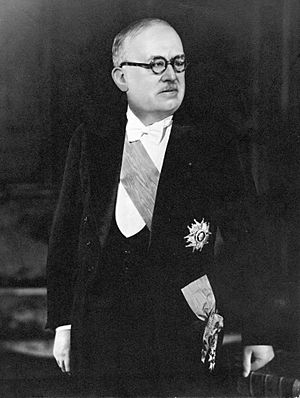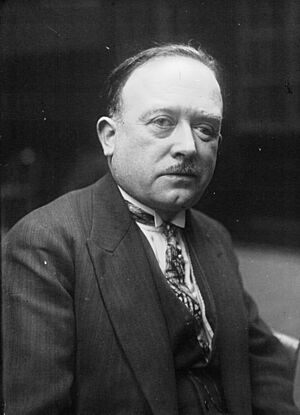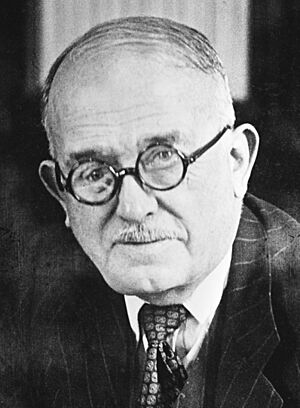Vincent Auriol facts for kids
Quick facts for kids
Vincent Auriol
|
|
|---|---|

Auriol in 1947
|
|
| President of France | |
| In office 16 January 1947 – 16 January 1954 |
|
| Prime Ministers | Léon Blum Paul Ramadier Robert Schuman André Marie Henri Queuille Georges Bidault René Pleven Edgar Faure Antoine Pinay René Mayer Joseph Laniel |
| Preceded by | Albert Lebrun |
| Succeeded by | René Coty |
| President of the National Assembly Constituent until 27 November 1946 |
|
| In office 31 January 1946 – 21 January 1947 |
|
| Preceded by | Félix Gouin |
| Succeeded by | Édouard Herriot |
| Personal details | |
| Born | 27 August 1884 Revel, France |
| Died | 1 January 1966 (aged 81) Paris, France |
| Political party | French Section of the Workers' International |
| Spouse |
Michelle Auriol
(m. 1911) |
| Alma mater | Toulouse 1 University Capitole |
| Signature | |
Vincent Jules Auriol (born August 27, 1884 – died January 1, 1966) was a French politician. He served as the President of France from 1947 to 1954.
Contents
Early Life and Political Beginnings
Vincent Auriol was born in Revel, Haute-Garonne, France. He was the only child of Jacques Antoine Auriol, a baker, and Angélique Virginie Durand. Interestingly, his great-grandmother was a cousin of the famous English engineer, Isambard Kingdom Brunel.
Auriol studied law and earned his degree in 1904. He then started his career as a lawyer in Toulouse. He was a strong believer in socialist ideas. In 1908, he helped start a newspaper called Le Midi Socialiste. At this time, he was also the head of the Association of Journalists in Toulouse.
Entering French Politics
In 1914, Vincent Auriol became a Socialist Deputy for Muret in the Chamber of Deputies. He held this position until 1942. He also served as the Mayor of Muret from 1925 to 1947. From 1928 to 1947, he was a member of the local council for Haute-Garonne.
In 1920, the SFIO (a socialist party) split up. Auriol chose not to join the new SFIC. Instead, he became a leader of the remaining SFIO, working alongside Léon Blum.
Auriol became a key spokesperson for his party on money matters. He led the Finance Committee in the Chamber of Deputies from 1924 to 1926. His first job in the government was as Minister of Finance under Léon Blum. During this time, he made the French money (the French franc) worth 30% less compared to the United States dollar. This decision was debated a lot.
Later, he served as Minister of Justice. He was also the Minister of Coordination of Services in a short-lived government led by Blum in 1938.
During World War II
In 1940, Vincent Auriol was one of the 80 deputies who voted against giving special powers to Prime Minister Philippe Pétain. These powers led to the creation of the Nazi-backed Vichy government. Because of his vote, Auriol was put under house arrest.
He managed to escape in October 1942 and joined the French Resistance. He fought with the resistance for a year. In October 1943, Auriol went to London. He represented the Socialists at the Free French Consultative Assembly, which was set up by Charles de Gaulle in Algiers. In July 1944, he represented France at an important meeting in the United States called the United Nations Monetary and Financial Conference at Bretton Woods.
Postwar Leadership and Presidency
After World War II, Auriol became the Minister of State in Charles de Gaulle's temporary government. He helped write the constitution for the new French Fourth Republic. He also served as the President of the assemblies that created this constitution. He believed in a "third force" in politics. This was a middle path between Communism and the ideas of Charles de Gaulle (called Gaullism).
Auriol led the French group to the United Nations. In 1946, he was France's first representative on the United Nations Security Council. He was a Deputy for Haute-Garonne in the National Assembly from 1946 until 1947.
Becoming President of France
On January 16, 1947, the National Assembly elected Vincent Auriol as the first President of the Fourth Republic. He won by a large number of votes.
As president, Auriol tried to bring different political groups in France together. He also worked to improve relations between France and its allies. However, he faced challenges. France's economy was struggling after the war, and there was political unrest. The war in Indochina was also a difficult issue.
In 1947, many strikes happened across France. These strikes sometimes turned violent. The government had to send 80,000 soldiers to deal with what they called an "insurrection". The Communist Party, which often supported the strikes, was removed from the government. The strikes ended, but more happened in 1948 and 1953.
Challenges in the Colonial Empire
During Auriol's time as president, France's colonial empire began to weaken. There were more clashes in places like Morocco, Madagascar, Algeria, and Tunisia. For example, an Algerian independence group, the Front de Libération Nationale, was formed in 1951. In 1953, the French removed Mohammed V, the Sultan of Morocco, after he asked for more independence. France also fought an uprising in Madagascar and put Tunisian independence leader Habib Bourguiba in prison in 1952.
Leaving Office
When Auriol's term as president ended, he decided not to run again. René Coty became the next President of France on January 16, 1954. Auriol famously said about his time in office: "The work was killing me; they called me out of bed at all hours of the night to receive resignations of prime ministers." There were eighteen different governments during his seven years as president.
After his presidency, Auriol became an elder statesman. He wrote articles about political topics. In 1958, he became a member of the Constitutional Council of France. He left the SFIO party in the same year. He did not support the new constitution in the 1958 national vote. In 1960, he resigned from the Constitutional Council to protest the growing power of Charles de Gaulle's presidency. In 1965, he supported François Mitterrand for president.
Vincent Auriol passed away on January 1, 1966, in Paris. He was buried in Muret, Haute-Garonne.
Personal Life
On June 1, 1911, Vincent Auriol married Michelle Aucoutuier. They had a son named Paul (born 1919). The famous French pilot Jacqueline Auriol was his daughter-in-law.
See also
 In Spanish: Vincent Auriol para niños
In Spanish: Vincent Auriol para niños
- Politics of France
 | Kyle Baker |
 | Joseph Yoakum |
 | Laura Wheeler Waring |
 | Henry Ossawa Tanner |



